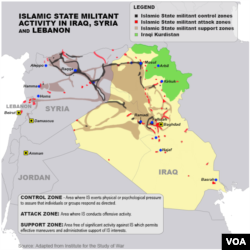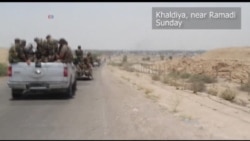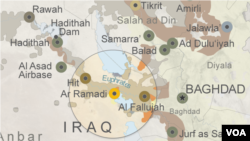U.S. officials on Sunday blamed Iraqi forces for Islamic State advances in the country in recent days, as reports emerged that the militant group has seized another border post and killed hundreds in Syria.
Syrian state media say IS fighters executed at least 400 people in the last week since capturing the town of Palmyra, also known as Tadmor.
In neighboring Iraq, where the Islamic State group took control of the Al-Walid border post in the last 24 hours, military and paramilitary forces are mounting a counteroffensive against the insurgents in Anbar province. But in an interview that aired Sunday, U.S. Defense Secretary Ash Carter criticized Iraq's reaction to Islamic State. He told CNN the IS takeover of Ramadi one week ago shows Iraqi forces do not have the "will to fight."
"What apparently happened is the Iraqi forces just showed no will to fight. They were not outnumbered," Carter said. "In fact, they vastly outnumbered the opposing force. That says to me, and I think to most of us, that we have an issue with the will of the Iraqis to fight ISIL and defend themselves."
National Security Advisor Susan Rice echoed Carter's concerns in an interview on CBS.
"Iraqi security forces face their own internal challenges... It's an uneven force in terms of will, equipment and leadership," Rice said, adding that the United States is working with them to address what she categorized as "weaknesses."
Shortly after the interviews aired, the head of the Iraqi parliament's defense and security committee, Hakim al-Zamili, told the Associated Press that Carter's comments are "unrealistic and baseless." He said the United States is trying to shift blame to Iraq for Washington's failure to provide "good equipment, weapons and aerial support" to Iraqi forces.
The U.S.-led coalition conducted a heavy air assault against IS positions overnight Sunday, with 11 airstrikes in Syria and 17 in Iraq, according to the Pentagon. In Ramadi, the bombings destroyed 19 armored vehicles, although it remains unclear if that equipment was among the items Iraqi forces left behind as they retreated.
Speaking from Baghdad Sunday, Alhurra TV news director Rafal Mahdi told VOA the militants are not in control of all of Anbar province. Some areas remain contested; but at least two cities on the highway from Ramadi to the Syrian border -- Haditha and Baghdadi -- are under IS siege, although they have not been seized.
"Security forces supported by tribal fighters still remain in (those) cities, but with weak capabilities when compared to ISIS, (which) has secured weapons and military vehicles left by the retreating army forces and police," Mahdi described.
As IS moved into Ramadi in the last 10 days, Anbar provincial officials and tribal sources told VOA's Kurdish service they believe the response from the central government on the newest frontline against Islamic State was slow to arrive.
Marina Ottaway, a senior scholar with the Woodrow Wilson Center’s Middle East Center, described Iraq’s military as well-trained and robust – but lacking morale.
“They’re better trained than anybody else, and they have much larger numbers than anybody else,” Ottaway said, but “they don’t know what they are fighting for, or they are poorly led."
VOA reporter Carol Guensburg and VOA's Kurdish service contributed to this report.








